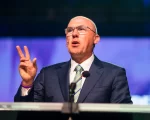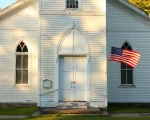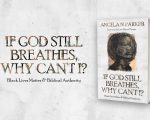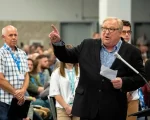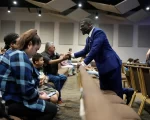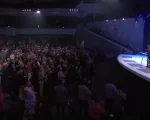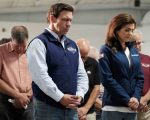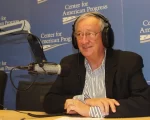News
SBC Messengers Reelect Texas Pastor Bart Barber to a Second Term as President
Barber's reelection seems to indicate that Southern Baptists approve of the direction the convention is going and marks the third time a candidate backed by the Conservative Baptist Network has been defeated.
Preachers Confront Christian Nationalism
This issue of A Public Witness examines sermons preached on Sunday across the country to highlight what pastors participating in Faithful America's pre-Flag Day event had to share about the dangers of Christian Nationalism.
Review: If God Still Breathes, Why Can’t I?
In "If God Still Breathes, Why Can't I?: Black Lives Matter and Biblical Authority," scholar Angela N. Parker compellingly makes the case that doctrines of biblical inerrancy and infallibility, which are prominent within evangelicalism and fundamentalism, serve as tools of White supremacy.
Doomed or Sign of Hope? Pope Francis’ Mission for Peace in Ukraine Is Underway
Cardinal Mateo Zuppi returned from Kyiv on Tuesday where he was sent by the pope to promote a just peace in Ukraine.
Before Advocating for Women in Ministry, Rick Warren Split With SBC Over Global Fellowship
Rick Warren has been mounting a public campaign as he urges Southern Baptists to not kick out churches for ordaining women ministers. While his advocacy sparked recent profiles, that coverage leaves out an earlier time when Warren publicly broke with the SBC over its attempt to draw narrower lines for fellowship.
Reparations Campaign Takes New Forms With Bible Study, Juneteenth March
'The case for restitution and restoration is laid out across the Old Testament and New Testament,' reads the introduction of the National Council of Churches' study.
With Turning Point Faith, Pastors Use Politics as a Church-Growth Strategy
For a growing number of evangelical pastors, embracing right-wing rhetoric is seen as a way to put more people in the pews — and it may be working.
Florida Gov. Ron DeSantis Woos GOP Christian Voters But Stays Tight-Lipped on His Own Catholic Faith
Ron DeSantis’s religious rhetoric and hard-charging policies are at the center of his outreach to White evangelicals. And yet, when it comes to his own Catholicism, the culture warrior is much more guarded, rarely mentioning the specifics of his faith and practice.
Welton Gaddy, Former Southern Baptist Who Became a Champion of Liberal Christianity, Dies
The Rev. C. Welton Gaddy, a pastor and former president of Interfaith Alliance who went from being a conservative Southern Baptist leader to an advocate for interfaith relations and LGBTQ Christians, died Wednesday at the age of 81.
Arabic ‘In God We Trust’ Signs Will Test Limits of Louisiana’s Law
Schools across Louisiana will also receive free LGBTQ+ Pride-themed posters to hang in their classrooms, though the designs might not be what some state lawmakers had in mind when they passed the new mandate Tuesday.

